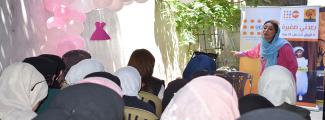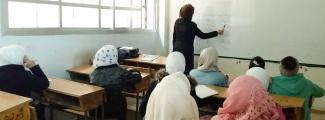Early marriage is a very important issue, especially in our beloved country, where there are still many families that give away their daughters for marriage at a very young age. Reasons that drive these families to do such a thing include customs and traditions, as well as socio-economic reasons.
Therefore, SSSD, in cooperation with the United Nations High Commissioner for Refugees (UNHCR), implemented a campaign entitled “A Child is Raising Another”, as part of the GBV programme at Al-Hosn Community Center in Al-Hosn, Homs. The aim of this campaign was to stop the spreading of such a dangerous phenomenon.
Target groups included women, men, and adolescent boys and girls from both the local and internally displaced communities, as well as returnees.
The campaign included the active participation of adolescents of the Child Protection Club, who presented silent expressive plays in hopes of raising awareness of the negative effects of early marriage. This phenomenon is actually regarded as a form of violence against girls, due to the burdens and responsibilities they are forced to carry at an age where they are expected to play and learn, as they are neither psychologically nor physically capable of carrying such burdens and responsibilities.
Attendees reacted positively during the campaign, emphasizing the important principles that were presented. Furthermore, one of the adolescent girls said at the end of the campaign: “Our body is still too fragile to carry such responsibilities… “
One of the fathers also added: “It is unacceptable to give our children away for marriage at a young age! In my opinion, the right age for marriage is 25 years for women and 30 for men. It is just sad and wrong for a child to marry another, not to mention a child actually having to raise another!”


